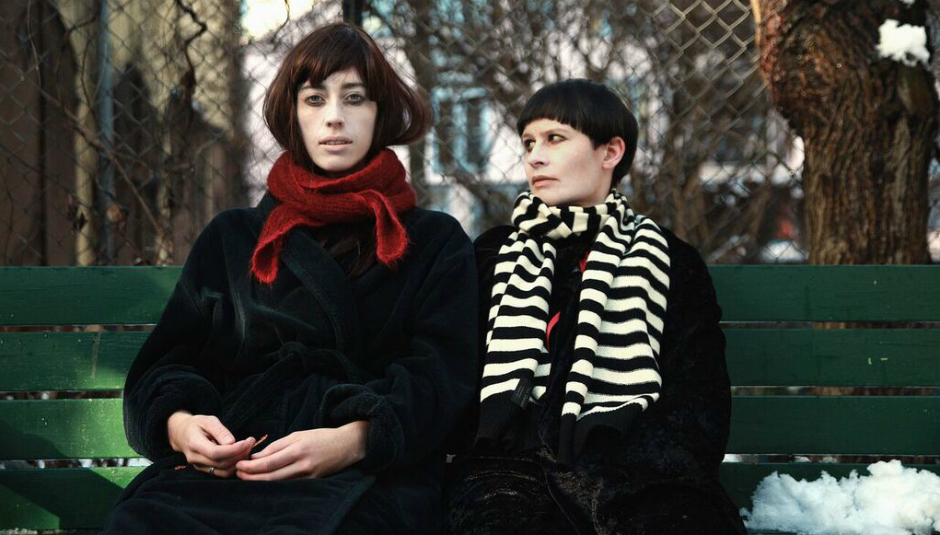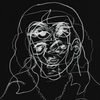I greet Jenny Hval on the telephone in her native Norway and, despite just finishing her new album Blood Bitch, she is already working on more material – just one year after 2015’s Apocalypse, girl. “Let me just do something before we talk…I’m working on something and I’m just going to save it.” I begin by asking if it takes her a long time to write songs, wondering if this is why she's started so early, but it soon becomes clear this is far from the case. “I’m crazy and can write songs in an hour! Most of my songs are written within an hour just because I’m very fast with feeling what sounds right, and if things don’t sound right then I just scrap it.” Recording her first two albums under the alias Rockettothesky, Hval has written three further critically acclaimed albums in just under six years. “When it comes to editing music, you need to go by your gut feeling and you don’t have that for very long at a time. Working fast and feeling what’s right is quite an intense but short process for me.”
Reunited with the producer from her last album, Lasse Marhaug, Hval’s new album sees her entering the uncanny – a gothic hinterland where vampires and blood are used as devices to explore identity and subjectivity. It's perhaps the perfect backdrop to revisit the genre that brought Hval into the music industry aged 17 – goth metal. Given that Hval’s work has been described variously as drone, electro-pop, avant-garde, multidisciplinary and transgressive, it is little surprise that no genre is ever off limits for an artist with such sonic diversity.
“I think there are points in your life where you reconnect with other points in your life. We are not living linearly; we all have these different, parallel existences and they sometimes drift into each other” she tells me. “I think I’ve now reached a stage where I can reconnect with my 17-year-old self so the transition back to the gothic was quite natural. It was not where I started out with my own interest in music but it was where I started out as in playing in my first band.”
Horror exploitation movies of the 1970’s – particularly the work of Spanish director Jesus Franco – acted as another source of inspiration to Hval, something seen with the almost film-like structure with which she has constructed Blood Bitch. She tells me, “he made a lot of very underrated and very low budget movies especially in the 1970’s. For a while, I did sum [the album] up as being akin to horror movies or exploitation movies, but now I think of it more, it’s probably a lot of other films too making it difficult to categorise genre-wise, but it was definitely influenced by the work of Franco from an interesting era of his filmmaking. I did get a little bit obsessed with his movies. One of them is called Female Vampires, and that became the name of a track. I really want the listener to feel like the different chapters of Blood Bitch form a whole, so it is like you are watching a film. It’s much easier then to put really interesting sonic contrasts within one song. Like I really loved making the song ‘The Plague’ because it’s like a moment in a film where something arrives that you do not expect. It’s made of a lot of material we didn’t use that could have been songs on the album.”
For Hval, the teenage protagonists in horror movies reminded her of her own emergence into the industry via goth metal as a teenager. “These young innocent girls probably resonated a little with me in that I did feel like I could see some sort of parallel with entering this metal scene when I was 16 or 17. I remember it as a bit of an entry point resembling the girls in horror movies when they came to that weird house or walked into that dark town or something…very exciting but also very unknown; there was a darkness, an uncertainty to it.” Hval’s producer was significant in helping her to reconnect with her gothic past – but in a way Hval didn’t expect. “Lasse connected with it because he came from the Noise world. He pointed out a link between one of my songs from the album that’s called ‘Secret Touch’ and a Norwegian black metal band called Darkthrone and one of their early albums. So we started playing these songs on top of one another and that was really interesting. So there was actually this link to a very important part in Norwegian music history that I missed because I was not in the black metal scene at all – I was too young. But it was actually a link that wasn’t back to where I came from when I entered on the Goth scene – it was such a different place – but it was the first time I’ve ever seen a link that had something poignant about it that was linking my music with other Norwegian music. I think my music has a drone quality, as well as being melodic, that can link it to many other genres.”
The influence of Marhaug’s experimental noise work seems more evident on Blood Bitch than Apocalypse, girl, something emerging from a much closer collaboration that previously. “We decided this time to be co-producers so we should share more of the production decisions I guess. As an artist, you always have the last word, it’s your work but we collaborated more on how we were going to do the album. And that was a really good way to go about it. I could have chosen to do things myself, but I love conversation so much. In fact, it’s a way of producing for me. I probably didn’t record very differently but there were a few things that were very different, like the fact we’d just have me play almost everything – there was a couple of musicians contributing a little bit – but it’s mostly a record stuck with me. It’s like I was in jail, in prison, forced to perform by a producer and myself! This album is much closer to the sound that I would make when I would just do my demos. Having a conversation about the art with Lasse made it much richer.”
Hval’s song ‘The Plague’ is one of the most inventive on the album and placed climatically towards the end of the album’s horror-movie structure. Taking the most time to make, the song is made up of cuts from other songs, with noise music being central to its production. “I worked with lots of noise artists who had very interesting ideas about music and energy. I wanted to make a track that within a pop music sort of hold, there can be a noise moment that can be kind of accessible.” Hval thinks noise music can help us re-think pop music. “It really opens up a lot of ways of thinking about pop music. You can just take all of these little fragments of songs and make a whole collage-like section of an album. Because ‘The Plague’ is made up from many different tracks, they all have an intention and they all have a drive – so there are no unmotivated sonic parts. It’s all very driven and with most of those sounds, I could have chosen to put two or three minutes of each of them as one song. For me, that was extremely interesting.”
Hval has already performed some of the songs from Blood Bitch live, including releases ‘Conceptual Romance’ and ‘Female Vampire’ at Primavera and Pitchfork festivals. Hval’s live shows are works of art in themselves, exploring issues as far-reaching as gender fluidity, the self and subjectivity through movement, spoken word, and dramatic performance. I ask about how she prepares, and if she is ready for her autumn tour. "I’m actually not ready! That’s quite common for me. I haven’t really been able to perform things for a while before I release them or record them. I used to do that a lot back when I played with a regular band I guess. I was performing things sometimes for a couple of years before I recorded them. And now, it’s the other way round which feels better to me actually – it’s more like the way I think. It feels great not to be ready because then I know I’ll need to be really creative and just make it happen very close to the moment we’re going to be on stage, which is really lovely because then the audience gets to see something that might not be perfect, but it’s definitely living.”
Collaboration is the at heart of Hval’s thought-provoking performances. “Sometimes, I am able to have a good idea of what’s going to happen on stage. Other times, I just think we’ll get through it and think as we’re doing it. We’ll perform it live and go from there. I’ve now worked with a few people on performative stuff on stage over the past year and a half and so I’ve a group of people thinking with me about my music and how to perform it. It’s very interesting. My music is made – and especially this new album – in a very personal headspace – it’s just me playing it inside my head. So it’s really lovely to have a team of brains and creative powers figuring out how to perform it. So we’re going to start doing that very soon. Obviously, we have already started performing some of it, but things will change and I’ll discover new things.”
Ambiguity and the search for meaning is something typical on Hval’s albums – nothing is fixed and meaning is fluid as experience and time changes. Meaning is not something she can pin easily to songs or live performances. “When I start performing things I also discover things like what the lyrics could actually be about. I’m pretty stupid when I record something, I don’t yet know what it’s about! So you might read the press release about the album and every journalist gets this idea that every artist sits down and thinks: 'Well, I want to write an album about this then, so okay, I’ll sit down and do it.’ But that’s not what it’s like.” She tells me she has to write what the album is about for press releases before she even knows herself what the album is about, something she figures out over time. “Sometimes I let people have ideas that I don’t really understand and I’m in the middle of performing something, and maybe by the third performance I’ll start understanding what’s happening around me and what the song is about. Sometimes I can’t even see it!”
As an artist whose work has eloquently and openly explored sexual identity, gender performativity, the male and female gaze and otherness in the self, it is perhaps no wonder that the character of Orlando, from the Virginia Woolf fictional biography of the same name, is a source of inspiration for Hval throughout Blood Bitch. In Virginia Woolf’s work, Orlando is three centuries old and changes gender half-way through the text. “I am sick to death of this particular self, I want another,” Woolf says of Orlando. In Hval’s reworking of the character, Orlando is a vampire travelling through space and time.
“I always think about Orlando when I am recording, as a reoccurring figure”, Hval explains. “Music to me is a place where you can create that sort of timeless figure moving through history and changing genders; I just find that narrative some kind of guiding star for what I want to do with art. I think I could have brought in Orlando for every single album I’ve done but in a very non-specific way. I may have been more explicit about it with this album because I also felt there was this strange vampire link. The vampire is also this kind of eternal character, stuck in time with this unnatural long life that was very intriguing to me. It also says something about my relationship with music and making music. Your voice in that moment becomes eternal. You have this very constructive and living form of yourself that is out of time almost, like a lovely but hopeless living eternal vampire moment.”
Blood Bitch carries Orlando’s fictional narrative alongside Hval’s own in what is described, in typically paradoxical fashion, as one of her most fictional and yet most personal album to date. Both narratives do however, tie into one of the album’s key themes of being “tired of subjectivity”, as she sings on ‘Female Vampire’, a breathless, synth-heavy ethereal dance track about a vampire hunting at a disco. “‘Let’s just be nobody a little bit more’ was a feeling I had after Apocalypse, girl. After being interviewed and asked a lot about subjectivity, representations of femininity and of being a female subject…I was just so tired of it, I just thought, let’s all be vampires instead!” She muses on how difficult subjectivity is in an age of social media anxiety. “Let’s just run away from being subjects without necessarily just disappearing or becoming blank faces. Imagine what it must be like being a vampire today and you’d had a long life and then you got into this world of social media and representation and this craziness around subjectivity? You’d be really sick of it I imagine.”
Tying in with the vampire theme is Hval’s investigation of blood. “From watching all these horror films, I started to think about the meaning of blood and really powerful blood. What I miss is not so much people being open about menstruation, as menstruation having huge artistic and creative power. I want there to be books filling shelves of theory about how menstruation is a huge and powerful subject in the arts. But you don’t have that. And when you have conversations about menstruation, it ends up being this very tiring conversation about politics. I find it more interesting to explore blood on the one hand as a very feminine quality but not necessarily just females, because in today’s society we have women who were not born in female bodies who don’t menstruate and then you have the other way round of menstruating men which is amazing when you think about it. The image of what that does to your creative brain in mind-blowing. There are so many things around menstruation that are not discussed as creative inspiration. But when I started touring last year with several women, which I’ve never done before, I just found it added such a huge interesting discussion – this being on tour and menstruating, being creative and investing in a new performance every night. To me, it’s all related – touring and menstruation, eternal life, the vampire and Orlando. It’s all cycles.”
Blood Bitch is out on 30 September, on Sacred Bones Records. For more information, including upcoming tour dates, visit her official website.






















